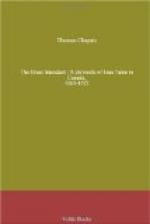It is interesting to find that Talon attempted to establish a method of settlement out of court, the principle of which was accepted by the legislature of the province of Quebec more than two centuries later. What was called the amiable composition of the French intendant may be regarded as a first edition of the law passed at Quebec in 1899, which provides for conciliation or arbitration proceedings before a lawsuit is begun. [Footnote: 62 Vict. cap. 54, p. 271.] Talon also introduced an equitable system of land registration.
In the proceedings of the Sovereign Council, of which Talon at this time was the inspiring mind, we may see reflected the condition and internal life of the colony. Decrees for the regulation of trade were frequent. Commercial freedom was unknown. Under the administration of the governor Avaugour (1661-63) a tariff of prices had been published, which the merchants were compelled to observe. Again, in 1664 the council had decided that the merchants might charge fifty-five per cent above cost price on dry goods, one hundred per cent on the more expensive wines and spirits, and one hundred and twenty per cent on the cheaper, the cost price in France being determined by the invoice-bills. In 1666 a new tariff was enacted by the council, in which the price of one hogshead of Bordeaux wine was fixed at eighty livres, and that of Brazil tobacco at forty sous a pound. In 1667 again changes took place: on dry goods the merchants were allowed seventy per cent above cost; on spirits and wines, one hundred or one hundred and twenty per cent as in 1664. The merchants did not accept these rulings without protest. In 1664 the most important Quebec trader, Charles Aubert de la Chesnaye, was prosecuted for contravention, and made this bold declaration in favour of commercial freedom: ’I have always deemed that I had a right to the free disposal




